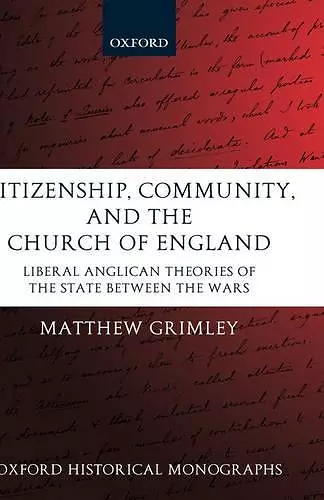Citizenship, Community, and the Church of England
Liberal Anglican Theories of the State Between the Wars
Format:Hardback
Publisher:Oxford University Press
Published:17th Jun '04
Currently unavailable, and unfortunately no date known when it will be back

This book traces the influence of Anglican writers on the political thought of inter-war Britain, and argues that religion continued to exert a powerful influence on political ideas and allegiances in the 1920s and 1930s. It counters the prevailing assumption of historians that inter-war political thought was primarily secular in content, by showing how Anglicans like Archbishop William Temple made an active contribution to ideas of community and the welfare state (a term which Temple himself invented). Liberal Anglican ideas of citizenship, community and the nation continued to be central to political thought and debate in the first half of the 20th century. Grimley traces how Temple and his colleagues developed and changed their ideas on community and the state in response to events like the First World War, the General Strike and the Great Depression. For Temple, and political philosophers like A. D. Lindsay and Ernest Barker, the priority was to find a rhetoric of community which could unite the nation against class consciousness, poverty, and the threat of Hitler. Their idea of a Christian national community was central to the articulation of ideas of 'Englishness' in inter-war Britain, but this Anglican contribution has been almost completely overlooked in recent debate on twentieth-century national identity. Grimley also looks at rival Anglican political theories put forward by conservatives such as Bishop Hensley Henson and Ralph Inge, dean of St Paul's. Drawing extensively on Henson's private diaries, it uncovers the debates which went on within the Church at the time of the General Strike and the 1927-8 Prayer Book crisis. The book uncovers an important and neglected seam of popular political thought, and offers a new evaluation of the religious, political and cultural identity of Britain before the Second World War.
The book is consistently vivid and readable. * Archbishop Rowan Williams, The English Historical Review *
This is certainly one of the best accounts of the various switches of emphasis and direction in Temple's complex intellectual career. * Archbishop Rowan Williams, The English Historical Review *
... this is a splendid contribution to twentieth-century intellectual history, which also manages to suggest a formidable agenda for contemporary political reflection. * Archbishop Rowan Williams, The English Historical Review *
illuminating analysis ... compelling and convincing narrative. * Church Times *
ISBN: 9780199270897
Dimensions: 224mm x 148mm x 19mm
Weight: 451g
300 pages